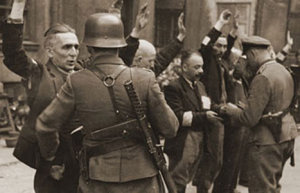You talk of simplification. But if you can simplify in one point, you can simplify in all. Instead of a million laws, a single law will suffice. What shall this law be? Do not to others what you would not they should do to you: do to others as you would they should do to you. That is the law and the prophets.
But it is evident that this is not a law; it is the elementary formula of justice, the rule of all transactions. Legislative simplification then leads us to the idea of contract, and consequently to the denial of authority. In fact, if there is but a single law, if it solves all the contradictions of society, if it is admitted and acceptedby everybody, it is sufficient for the social contract. In promulgating it you announce the end of government. What prevents you then from making this simplification at once?
— Pierre-Joseph Proudhon (1851), General Idea of the Revolution in the Nineteenth Century, Fourth Study, The Principle of Authority, § 2.2 ¶Â¶ 9–10.
Over at newsrack, lefty Thomas Nephew kindly took notice of GT 2008-05-16: Women and the Invisible Fist. Nephew wrote:
Via Jim Henley, who seems lately to be about metamorphosing your father’s (and/or mother’s) libertarianism into something more honest, multifaceted, and interesting. See also in this respect Henley’s Art of the Possible post, and the site as a whole: Liberals and libertarians on common ground... and otherwise.
Henley says that the challenge is to correct spontaneous malign orders without the tool of state violence.
I’m not sure that circle can be squared — some countervailing force is needed against spontaneous malign orders, and that force will need some agreed on norms of justice and enforcement. But I’m interested that libertarians are thinking about the challenge.
— Thomas Nephew (2008-05-24): Worth reading
That lead to some interesting discussion in the comments thread. I replied:
Thomas,
Thank you for the kind mention, and for the thoughtful comments.
You write: “Henley says that the challenge is to ‘correct spontaneous malign orders without the tool of state violence.’ I’m not sure that circle can be squared — some countervailing force is needed against spontaneous malign orders, and that force will need some agreed on norms of justice and enforcement”
There are a couple of different kinds of malign spontaneous orders that need to be differentiated here.
The first are malign undesigned orders that emerge, in part, from diffuse forms of violence — what I called “invisible fist” processes, as with the socio-cultural ripple effects of stranger-rape and other prevalent forms of violence against women.
The second are malign orders that don’t emerge from diffuse forms of violence, but rather from voluntary interactions. Unlike some libertarians, I believe that there are plenty of examples of these, too (for example, certain kinds of widespread credentialism and elitism that have emerged over the past century, and which have a big effect on education and on the workplace). These malign undesigned orders are often intimately connected with social orders that have coercive elements (for example, I’d say that certain pernicious forms of credentialism and managerialism, which contribute to classism and to the exploitation of working folks, have an awful lot to do with consistent government intervention on behalf of the managerial class and against the deskilled proletariat over the past century — cf. for examples my essay Scratching By at http://www.fee.org/publications/the-freeman/article.asp?aid=8204 or Kevin Carson’s Mutualist Blog at http://mutualist.blogspot.com/) — but, while intimately connected, are not identical with them (it’s likely that even without that government intervention they might live on through institutionalized cultural prejudices, unless deliberately confronted and undermined).
Libertarians and anarchists can consistently endorse the use of physical force as part of the response to the former (violent) sort of undesigned order; they can’t consistently endorse the use of physical force as part of the response to the latter (non-violent, but still ugly) sort of undesigned order.
In the second case, though, I ought to stress that not abandoning the use of force doesn’t mean abandoning the use of confrontation or hardball tactics–they just have to be carried out through tactics and institutions outside the political arena, the legal arena, or the regulatory bureaucracy. (On what should be done instead, I’m really an old Leftist at heart: I think people should form fighting unions and community organizations, build counter-institutions and mutual aid societies, use targeted and general strikes, boycotts, work-to-rule, hardball forms of social ostracism, stage sit-ins, etc. etc. etc. Forget about the government; we can do this ourselves.)
In the first case, the use of countervailing physical force in defense of self or others is defense, not aggression, so it need not offend any libertarian or anarchist sensibilities (unless one is a principled pacifist–which I’m not, and which most libertarians and anarchists aren’t either). You worry that that force will need some agreed on norms of justice and enforcement.
I’m inclined to agree with that (although we might disagree on what the importance of agreement
is here). But supposing that we do agree, I don’t think it tells against Jim’s point. Agreed-upon norms of justice and enforcement aren’t in and of themselves a problem for anarchism or libertarianism. The question is how the agreement on those norms is brought about: whether the agreement comes about by general acquiescence to privileged demands, or whether it comes about by means of a broad consensus among equals.
Government ensures agreement
upon these norms by erecting privileged institutions which are legally empowered to force everyone else to acquiesce to the norms they propound and act on.
Anarchy, on the other hand, doesn’t mean chaos or the break-up of any agreed-upon norms of justice or enforcement. (At least, that’s not what anarchy
means in the mouths of anarchists who use the term.) What it does mean is that any agreement upon those norms should be brought about through the free interactions among equals and by the emergence of a broad social consensus.
Further, anarchists generally believe that that kind of consensus can rightfully be acted on by any free association that puts reasonable norms for justice and enforcement into practice — rather than being limited to a privileged class of government-approved cops, judges, etc. The idea here being that the justice of judgments and the righteousness of enforcement are things that ought to be assessed on the merits of the conduct itself, not according to the identity or the political status of the judge or the enforcer. That is to say, that it should be considered as a matter to be resolved by appeals to the content of the norms, rather than to the political status and prerogatives of the body propounding them.
So the ideal here is not to abolish any general norms of justice or enforcement, but rather to keep the ideal of consensus on norms while detaching the crafting of the consensus from the imposition of exclusive government-granted prerogatives.
Does that help clarify, or does it muddify?
— Rad Geek (2008-06-01): Comments on Worth reading

Thomas replied with some comments on professionalization and specialization in the law, which are the main thing that I want to focus on today. In part because the issue is interesting and important in itself; in part also because the way that police forces and the legal system operate today is, in many different ways, ideologically dependent on the idea that we need to turn a great deal of our lives and freedom over to a cadre of trained, specialized legal professionals
for our own protection
and in order to ensure justice and social peace. He wrote:
Thank you very much for your comment — it’s really an excellent post in its own right. I think I understand what you’re driving at; I’m trying to decide what I think about it, and that takes me longer than maybe it should. My thoughts so far:
I suppose I have a sneaking agreement that there’s too much that’s privileged and mysterious about judges, lawyers, and law enforcement. But I also think there’s specialization and craft in these pursuits, just as there is in, say, cabinetmaking or watchmaking. Those are pursuits I leave to others; maybe so is law enforcement or judging. Even just
a policeman has to master tons of information and training — knowing the law, when to wait, when to intervene, how to gather evidence, how to avoid violating rights while pushing back against spontaneous malign orders.
But I also see the difficulty with that analogy: unlike with the cabinet or watchmaking trades, I recognize I have a citizen’s responsibility in understanding my political system and helping point it in the right direction, to the best of my puny abilities.
— Thomas Nephew (2008-06-02): Comments on Worth reading
By way of reply, I argued that the need for specialized expertise and training (1) isn’t an argument for monopoly, and also (2) is itself a function of the expansiveness and authoritarianism of the State:
Thomas,
Thank you for your kind words.
You write: “But I also think there’s specialization and craft in these pursuits, just as there is in, say, cabinetmaking or watchmaking.”
Probably so, although I’m inclined to think that there is, or ought to be, much LESS specialization and craft than the professionalized government enforcers and judges would have you believe. To be sure, the government laws that are on the books today are tremendously complicated and require years of specialized training and practice to even begin to get a good grip on a relatively small specialty. But I think that that’s precisely because the people who make and use the laws have a political and a professional interest in making those laws extremely complicated, and in having them cover an extremely wide and not very well defined scope of human affairs. Libertarians and anarchists believe that regularized enforcement should cover a much more precisely delimited and a much, much smaller field than it currently does, so to some extent the problem vanishes along with the laws that libertarians and anarchists believe ought to be abolished.
For example, labor relations law as it presently exists is extremely complicated — it requires making a lot of very fine distinctions, balancing many different prerogatives granted to and regulatory limitations imposed upon unions, individual employees, and employers, etc. etc. etc. It takes a lot to even understand the basics of the situation, and the tricky details of a concrete case often can’t even be resolved without hashing out the issues in bureaucratic negotiations through the NLRB or in federal court. But the complexity of the legal situation is clearly a function of its being channeled through the federal regulatory bureaucracy. That situation clearly benefits NLRB bureaucrats and professional labor lawyers; it’s much less clear that it benefits the rank-and-file workers for whose benefit this sort of thing was supposedly constructed, but who are substantially deprived of any real control over the process by putting so much of it into the hands of professional legal experts. If agreed-upon norms of justice and enforcement were (as anarchists believe that they should be) limited only to the issue of protecting innocent people from being attacked by physical force, or vindicating their rights after the fact if they should be attacked — with all the rest to be handled by free contracts between the individual parties, unregimented by a government bureaucracy, and by whatever forms of nonviolent leverage and activism that the creativity of organized workers and a fighting union might devise — then it’s much less clear what need for specialization or professionalization there would be. (There might still be a lot of need for impartial arbitrators; but impartiality is distinct from technical expertise, and is something you can get by finding any third party of good will and good sense for the duration of the arbitration; it doesn’t require a distinct class of professional arbitrators.)
Generalizing from that case, I agree with Lysander Spooner that if the realm of enforcement were strictly limited to questions of interpersonal justice, then, quote:
No objection can be made to these voluntary associations upon the ground that they would lack that knowledge of justice, as a science, which would be necessary to enable them to maintain justice, and themselves avoid doing injustice. Honesty, justice, natural law, is usually a very plain and simple matter, easily understood by common minds. Those who desire to know what it is, in any particular case, seldom have to go far to find it. It is true, it must be learned, like any other science. But it is also true that it is very easily learned. Although as illimitable in its applications as the infinite relations and dealings of men with each other, it is, nevertheless, made up of a few simple elementary principles, of the truth and justice of which every ordinary mind has an almost intuitive perception. And almost all men have the same perceptions of what constitutes justice, or of what justice requires, when they understand alike the facts from which their inferences are to be drawn.
Men living in contact with each other, and having intercourse together, CANNOT AVOID learning natural law to a very great extent, even if they would. The dealing of men with men, their separate possessions and their individual wants, and the disposition of every man to demand, and insist upon, whatever he believes to be his due, and to resent and resist all invasions of what he believes to be his rights, are continually forcing upon their minds the questions, Is this act just? or is it unjust? Is this thing mine? or is it his? And these are questions of natural law; questions which, in regard to the great mass of cases, are answered alike by the human mind everywhere.”
— Lysander Spooner (1882), Natural Law, or the Science of Justice, section 4.
And I would follow up your second point by urging that it is dangerous, and to some degree irresponsible, to adopt large-scale systems of law and practice that practically require ordinary citizens to abandon the questions of political and interpersonal justice to a privileged, insular, and easily corrupted class of specialists.
But, secondly, I would also argue, further, that even if the requirements of justice ARE complicated enough in some particular case that it requires some specialized training and expertise to sort them out, or where correctly applying and implementing them requires specialized training and expertise in something else (e.g., for enforcers, training and expertise in de-escalating potentially violent situations may be a form of specialization well worth having), that seems to me like an argument for leaving the field open to many specialists, who can offer their services to anyone who is interested in retaining them (e.g. many private associations for arbitration and/or defense, which people go to on the basis of choice rather than being forced to go to one in particular on the basis of fixed territorial monopolies). Not so much an argument for limiting the field to a single fixed, institutionalized class of specialists (e.g. a government court or a government police force with rigidly and exclusively defined territorial or topical jurisdictions).
The first (non-monopolistic) solution really would make the business of law a skilled trade or profession, much like watchmaking or medicine, where people go to acknowledged experts freely, but aren’t forced to choose one particular expert on the basis of political status, and can choose another, on the basis of their own considered judgment and comfort levels, or for that matter can still choose none at all, if they decide to hazard the risks and trouble of doing it for themselves.
The second, monopolistic solution doesn’t make the business of law so much like skilled trades and professions, but rather like a feudal or command economy, in which people are assigned particular experts and forced to turn matters over to that particular expert rather than another, on the basis of the political status of the experts rather than on the basis of broadly and consensually acknowledged expertise. It’s that which, as an anarchist, I really object to.
Does that help? What do you think?
— Rad Geek (2008-06-02): Comments on Worth reading
In reply, Thomas raised some fairly common counter-objections and worries, especially about the dangers supposedly posed by the devolution of policing from public
control to private
defense — or, to spin it another way, from government to civil society.
But the complexity of the legal situation is clearly a function of its being channeled through the federal regulatory bureaucracy. That situation clearly benefits NLRB bureaucrats and professional labor lawyers; it’s much less clear that it benefits the rank-and-file workers for whose benefit this sort of thing was supposedly constructed, but who are substantially deprived of any real control over the process by putting so much of it into the hands of professional legal experts.
This seems like blaming the chickens for the fox’s raid on the chicken coop. At least lately, the situation you refer to clearly benefits management in most NLRB disputes. I’d put down most of what’s wrong with NLRB to its being an easily subverted agency, most of the blame for that to corporations achieving via the back door of a compliant board what they couldn’t via the statutes authorizing the NRLB in the first place … and most of what’s wrong with those statutes to earlier corporate influence in making things like unionization far too difficult in the first place. Rightly administered and empowered, NLRB ought to be a counterweight to moneyed and propertied interests that have no interest in worker’s rights. The fact that it isn’t rightly administered and empowered seems to me a measure of the strength of the forces arrayed against it, not of the weakness of the idea of an NLRB itself.
The first (non-monopolistic) solution really would make the business of law a skilled trade or profession, much like watchmaking or medicine, where people go to acknowledged experts freely, but aren’t forced to choose one particular expert on the basis of political status, and can choose another, on the basis of their own considered judgment and comfort levels, or for that matter can still choose none at all, if they decide to hazard the risks and trouble of doing it for themselves.
At least for legal representation, that — in theory — is already the case, isn’t it? The problem is when the innocent can’t afford a Clarence Darrow, a Johnny Cochrane, or an F Lee Bailey to get them off but the guilty can.
I don’t see how to bid out for police functions, though, without that turning into yet another part of society baldly favoring the rich and privileged over the poor and disenfranchised. While that may be too much the case even with a police force as public monopoly, I think it would surely be worse in a “Deadwood“-type services-to-the-highest-bidder world. But maybe I’m misunderstanding you in how police functions ideally ought to work.
— Thomas Nephew (2008-06-02): Comments on Worth reading
To which I made some counter-counter-objections, and raised what I think ought to be some obvious questions:
Thomas,
You write: “This seems like blaming the chickens for the fox’s raid on the chicken coop.”
I’m not sure what you mean. I don’t blame rank-and-file workers for the way the NLRB functions. I blame the politicos, the “Progressive” bosses, and the conservative union bosses who pushed to create the system. (Radical unions, like the I.W.W., rightly opposed the system as an effort to promote conservative unionism and to capture and domesticate unions through a combination of government patronage and government regulation.)
You write: “Rightly administered and empowered, NLRB ought to be a counterweight to moneyed and propertied interests that have no interest in worker’s rights.”
Two things.
First, I have no confidence in anyone’s ability to craft a regulatory agency that successfully resists being substantially captured by the interests that it regulates. I can’t think of any example in the history of American regulatory bodies where this has been pulled off for any length of time, and I don’t think it should be particularly surprising that, since political entities respond to political incentives, they will tend to be administered in a way that systematically benefits the wealthiest and most politically-connected people.
Second, even if the NLRB were ideally administered, the system is designed from the ground up as a means of constraining union demands and restricting unions to the most conservative and least effectual methods. (Thus, the Taft-Hartley bans on secondary strikes, secondary boycotts, union hiring halls, wildcat strikes, etc. etc. etc.; thus the emphasis on a heavily regulated process of collective bargaining, controlled by very elaborate legal requirements that are often next to impossible for rank-and-file workers to understand, in place of extremely effective and very simple to understand tactics, like work-to-rule and other forms of direct action in the workplace.)
You write: “At least for legal representation, that — in theory — is already the case, isn’t it?”
Well, not entirely — you can choose one lawyer rather than another, as long as you can afford their fees, but you can’t choose anyone as your advocate except those who have been officially approved for membership in the government-created and government-regulated lawyer’s guild. But lawyers weren’t the “experts” I was referring to; I was referring to the fact that the government forces people to take legal disputes before specific judges (with jurisdiction fixed by the issue in dispute and by accidents of geography), and excludes other no-less qualified and impartial experts from taking up the dispute simply because the privileged judge has a particular political status and the other would-be arbitrator doesn’t. If we are really talking about a form of specialized expertise here, like that of the watchmaker or of the doctor, then anyone should be able to take the case, not just a judge deemed to have that topic and that location within his bailiwick by the government.
You write: “I don’t see how to bid out for police functions, though, without that turning into yet another part of society baldly favoring the rich and privileged over the poor and disenfranchised.”
Well, I don’t know. Isn’t that already how government policing works?
Tax funding doesn’t prevent government cops from treating poor people pretty shitty, or from acting as an instrument of class power. In fact, the fact that poor neighborhoods have no real control over who provides policing in their neighborhoods, and no way of cutting off their portion of the funding for neglectful or abusive police forces, is part and parcel of the problem.
Anyway, I’m not sure what you mean by bid out for police functions.
If you mean the government outsourcing policing to private security corporations (Wackenhut, Blackwater, whatever), I’m not for that, and I don’t consider it an example of free market self-defense. I think that all government involvement in policing (whether in-sourced or out-sourced) should be abolished.
If you mean individual people choosing to cover the costs of policing, and having a choice about who, if anyone, they get police services from, then I don’t think there’s any guarantee that the result will be (even more) plutocratic policing. It’s true that, if all policing were based on free association and not on government monopoly, there might well be some policing that is done by private goon squads for hire, and those might have an incentive to favor the rich over the poor. But (1) again, I’m not convinced that they’d have more of an incentive to do so than government cops already have; and (2) there are lots of other ways of using free association to get self-defense and neighborhood defense done. For example, the Black Panthers and the Young Lords organized historically oppressed people to arm themselves, and to patrol and defend their own neighborhoods (including defending them from the predation of abusive white cops). In any case, where there are many, competing and countervailing associations that serve defensive functions, if one association becomes especially neglectful, or, worse, predatory, against marginalized people, other associations can move in to compete, or new associations can be formed, to check the first. But when policing is monopolized by a single institution, there is no real reason for them to try to please anybody outside of their firmest base of support (in the case of political monopolies, that means the ruling class–as is confirmed by how police departments already operate today). If they don’t please marginalized people, why would they care? They stay paid anyway, and there’s no countervailing force to hold them to account for their abusiveness.
My own view is that the need for any form of professional policing at all would be dramatically less in a free society than it is in the present day. (For example, in a free society there would be no drug laws, vice laws, or border laws, and thus no narcs, no vice cops, and no La Migra. There would also be much less entrenched urban poverty, because — for reasons I discuss in the Freeman article — ghettoized urban poverty as we know it is largely a function of interlocking government interventions against poor people’s survival strategies and attemtps to flourish through creative hustling; hence much less economically motivated crime, and also much less of certain kinds of antisocial behavior. So, again, this is, to a great extent, a problem that vanishes along with the needless government laws and endless government “wars” on consensual behavior, which I already favor abolishing. But, even if the demand for specialized policing were to remain just as high as it is today, I still think that it is far, far better to have a situation in which people are free to withdraw their support from abusive agencies, and where there are many acknowledged experts to keep each other in check, than a situation in which people are forced to pay for their own abuse, and in which cops are never held to account for wrongdoing by any means other than “handling it internally” and issuing the occasional “Oops, our bad”.
— Rad Geek (2008-06-01): Comments on Worth reading
It’s a fairly wide-ranging discussion, and you ought to read the whole thing if you want to follow up on some of the sub-threads about, for example, organizing, class, tactics, immigration, and so on. For now, I want to highlight the discussion about specialization and professionalization in policing. On that note, I want to stress that it’s precisely those ideals in lawyering and law enforcement that lead directly to things like this, and this, and this. And, less directly but very quickly, gets us from those to this and this. And that from there it doesn’t take a very slippery slope to get down to this and this and this.
And the perceived need for specialization, professionalization, and expertise is a need
which only exists because of the very system of law and enforcement it is invoked to justify. On a related note, consider this video (thanks to Jeremy at Social Memory Complex 2008-06-04: Don’t talk to the police), which provides both excellent legal advice, from the standpoint of simple self-interest, and some solid analysis of our present predicament how ordinary folks like you and me ought to relate to government cops under these conditions.
Without that system, without its politically-fabricated complexity, and without the tremendous latitude deliberately created by that complexity for government police to exercise arbitrary power in stopping, detaining, fining, and arresting suspect
people — the 10,000 or more crimes
that government law has fabricated, the crimes so numerous that not even the government itself can count them all anymore, and so potentially ruinous for anyone in trouble with the law that you have little choice but to regard anyone threatening to exercise their specialization and craft
in the law as little more than a dangerous soldier in a hostile, occupying force — without all that, I say, there would be no basis, no need, and no call for that complexity or that arbitrary authority, or for the privileged, professionalized retinue of lawyers and enforcers who are expected today to go around navigating that complexity and exercising that arbitrary authority, in order to solve
the very problems that the same complexity and arbitrary authority created in the first place.
Further reading:





